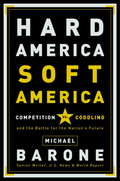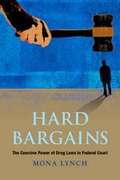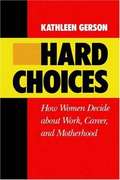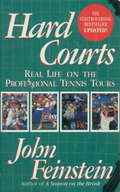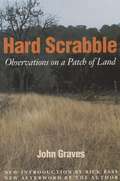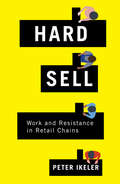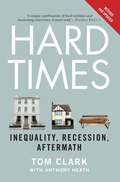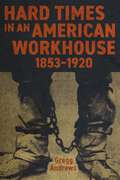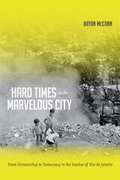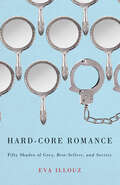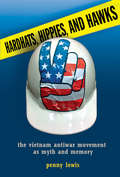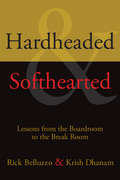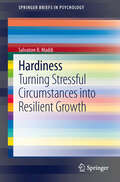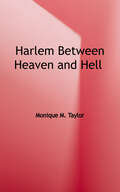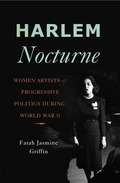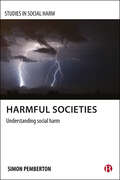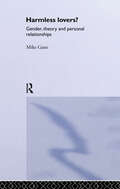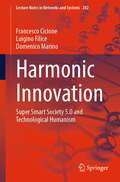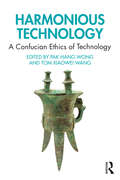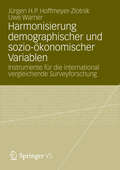- Table View
- List View
Hard America, Soft America: Competition vs. Coddling and the Battle for the Nation's Future
by Michael BaroneA peculiar feature of our country today, says Michael Barone, is that we seem to produce incompetent eighteen-year-olds but remarkably competent thirty-year-olds. Indeed, American students lag behind their peers in other nations, but America remains on the leading edge economically, scientifically, technologically, and militarily. The reason for this paradox, explains Barone in this brilliant essay, is that “from ages six to eighteen Americans live mostly in what I call Soft America—the parts of our country where there is little competition and accountability. But from ages eighteen to thirty Americans live mostly in Hard America—the parts of American life subject to competition and accountability.” While Soft America coddles, Hard America plays for keeps. Educators, for example, protect children from the rigors of testing, ban dodgeball, and promote just about any student who shows up. But most adults quickly figure out that how they do depends on what they produce. Barone sweeps readers along, showing how we came to the current divide—for things weren’t always this way. In fact, no part of our society is all Hard or all Soft, and the boundary between Hard America and Soft America often moves back and forth. Barone also shows where America is headed—or should be headed. We don’t want to subject kindergartners to the rigors of the Marine Corps or leave old people uncared for. But Soft America lives off the productivity, creativity, and competence of Hard America, and we have the luxury of keeping part of our society Soft only if we keep most of it Hard.Hard America, Soft America reveals: • How the American situation is unique: In Europe, schooling is competitive and demanding, but adult life is Soft, with generous welfare benefits, short work hours, long vacations, and state pensions• How the American military has reclaimed the Hard goals and programs it abandoned in the Vietnam era• How Hardness drives America’s economy—an economy that businesses and economists nearly destroyed in the 1970s by spurning competition • How America’s schools have failed because they are bastions of Softness—but how they are finally showing signs of Hardening• The benefits of Softness: How government programs like Social Security were necessary in what was a harsh and unforgiving America• Hard America, Soft America is a stunningly original and provocative work of social commentary from one of this country’s most respected political analysts.
Hard Bargains: The Coercive Power of Drug Laws in Federal Court
by Mona LynchThe convergence of tough-on-crime politics, stiffer sentencing laws, and jurisdictional expansion in the 1970s and 1980s increased the powers of federal prosecutors in unprecedented ways. In Hard Bargains, social psychologist Mona Lynch investigates the increased power of these prosecutors in our age of mass incarceration. Lynch documents how prosecutors use punitive federal drug laws to coerce guilty pleas and obtain long prison sentences for defendants—particularly those who are African American— and exposes deep injustices in the federal courts. As a result of the War on Drugs, the number of drug cases prosecuted each year in federal courts has increased fivefold since 1980. Lynch goes behind the scenes in three federal court districts and finds that federal prosecutors have considerable discretion in adjudicating these cases. Federal drug laws are wielded differently in each district, but with such force to overwhelm defendants’ ability to assert their rights. For drug defendants with prior convictions, the stakes are even higher since prosecutors can file charges that incur lengthy prison sentences—including life in prison without parole. Through extensive field research, Lynch finds that prosecutors frequently use the threat of extremely severe sentences to compel defendants to plead guilty rather than go to trial and risk much harsher punishment. Lynch also shows that the highly discretionary ways in which federal prosecutors work with law enforcement have led to significant racial disparities in federal courts. For instance, most federal charges for crack cocaine offenses are brought against African Americans even though whites are more likely to use crack. In addition, Latinos are increasingly entering the federal system as a result of aggressive immigration crackdowns that also target illicit drugs. Hard Bargains provides an incisive and revealing look at how legal reforms over the last five decades have shifted excessive authority to federal prosecutors, resulting in the erosion of defendants’ rights and extreme sentences for those convicted. Lynch proposes a broad overhaul of the federal criminal justice system to restore the balance of power and retreat from the punitive indulgences of the War on Drugs.
Hard Choices
by Jerry BucklandWhen low-income city dwellers lack access to mainstream banking services, many end up turning to 'fringe banks,' such as cheque-cashers and pawnshops, for some or all of their financial transactions. This predicament of 'financial exclusion' - faced by those underserved by conventional financial institutions - is comprehensively examined in Jerry Buckland's powerful study, Hard Choices.The first account of the nature and causes of financial exclusion in Canada, Hard Choices thoroughly integrates economic and social data on consumer choice, bank behaviour, and government policy. Buckland demonstrates why the current two-tier system of banking is becoming increasingly dysfunctional, especially in the context of new credit products that aggravate income inequality and stifle local economic growth. Featuring a foreword by esteemed economics scholar John P. Caskey, Hard Choices presents pragmatic policy improvements on both the public and private levels that can promote and build financial inclusion for all.
Hard Choices: How Women Decide about Work, Career, and Motherhood
by Kathleen GersonHow do women choose between work and family commitments? And what are the causes, limits, and consequences of the "subtle revolution" in women's choices over the 1960s and 1970s? To answer these questions, Kathleen Gerson analyzes the experiences of a carefully selected group of middle-class and working-class women who were young adults in the 1970s. Their informative life histories reveal the emerging social forces in American society that have led today's women to face several difficult choices.
Hard Courts: Real Life on the Professional Tennis Tours
by John FeinsteinThe new edition of this bestseller in hardcover features never-before-published, all-new inside info on the money, personalities and politics of pro-tennis: Jimmy, Monica, Boris, Martina, et al.
Hard Knocks & Soft Spots
by Paddy Doherty'I fight hard and love strong. I'm a traveller.'Paddy Doherty loves his life as an Irish traveller, but as a child he felt like an outsider. He was different to his siblings. On the rare occasions he went to school, he was bullied for being a gypsy boy. And beyond the gates of the camp he found nothing but hostility. Slowly, Paddy's hurt turned into anger and by the age of 11 he had started out on an illustrious career in bare-knuckle fighting. This earned him a position as one of the most well-respected (and feared) men in the travelling community. Yet while he won countless contests in the ring, the real battles he faced were very much outside.In this deeply honest autobiography, he tells of how he has loved and lost five children; plummeted to seven stone while battling depression, drink and drugs. He describes how it feels to be shot point-blank in the head and the lengths he'll go to to protect his people, as well as life since My Big Fat Gypsy Wedding and Big Brother.Told with all the warmth and humour he is famed for, Paddy's rich and colourful story is one that will stay with you for a long time to come.
Hard Scrabble: Observations on a Patch of Land
by John GravesThe author John Graves bought a worn-out patch of land in the hills south of Fort Worth which became a life-long attachment and this book is a humorously thoughtful description of how this new landowner becomes equally owned by the land he has settled on. In this book Graves takes us on a tour of his farm, which he calls Hard Scrabble, describing in turn the fields and streams, the plant and animal life, the weather, etc.
Hard Sell: Work and Resistance in Retail Chains
by Peter IkelerAlong with fast-food workers, retail workers are capturing the attention of the public and the media with the Fight for $15. Like fast-food workers, retail workers are underpaid, and fewer than 5 percent of them belong to unions. In Hard Sell, Peter Ikeler traces the low-wage, largely nonunion character of U.S. retail through the history and ultimate failure of twentieth-century retail unionism. He asks pivotal questions about twenty-first-century capitalism: Does the nature of retail work make collective action unlikely? Can working conditions improve in the absence of a union? Is worker consciousness changing in ways that might encourage or further inhibit organizing? Ikeler conducted interviews at New York City locations of two iconic department stores--Macy's and Target. Much of the book's narrative unfolds from the perspectives of these workers in America's most unequal city.When he speaks to workers, Ikeler finds that the Macy's organization displays an adversarial relationship between workers and managers and that Target is infused with a "teamwork" message that enfolds both parties. Macy's workers identify more with their jobs and are more opposed to management, yet Target workers show greater solidarity. Both groups, however, are largely unhappy with the pay and precariousness of their jobs. Combined with workplace-generated feelings of unity and resistance, these grievances provide promising inroads to organizing that could help take the struggle against inequality beyond symbolic action to real economic power.
Hard Times
by Anthony Heath Tom Clark2008 was a watershed year for global finance. The banking system was eventually pulled back from the brink, but the world was saddled with the worst slump since the 1930s Depression, and millions were left unemployed. While numerous books have addressed the financial crisis, very little has been written about its social consequences. Journalist Tom Clark draws on the research of a transatlantic team led by Professors Anthony Heath and Robert D. Putnam to determine the great recession's toll on individuals, families, and community bonds in the United States and the United Kingdom. The ubiquitous metaphor of the crisis has been an all-encompassing "financial storm," but Clark argues that the data tracks the narrow path of a tornado-destroying some neighborhoods while leaving others largely untouched. In our vastly unequal societies, disproportionate suffering is being meted out to the poor-and the book's new analysis suggests that the scars left by unemployment and poverty will linger long after the economy recovers. Politicians on both sides of the Atlantic have shown more interest in exploiting the divisions of opinion ushered in by the slump than in grappling with these problems. But this hard-hitting analysis provides a wake-up call that all should heed. "
Hard Times in an American Workhouse, 1853–1920
by Gregg AndrewsHard Times in an American Workhouse, 1853–1920, is the first comprehensive examination of a workhouse in the United States, offering a critical history of the institution in the Gilded Age and Progressive Era. Using the Old St. Louis Workhouse as a representative example, award-winning historian Gregg Andrews brings to life individual stories of men and women sentenced to this debtors’ prison to break rocks in the quarry, sew clothing, scrub cell floors and walls, or toil in its brush factory. Most inmates, too poor to pay requisite fines, came through the city’s police courts on charges of vagrancy, drunkenness, disturbing the peace, or violating some other ordinance. The penal system criminalized everything from poverty and unemployment to homelessness and the mere fact of being Black. Workhouses proved overcrowded and inhospitable facilities that housed hardcore felons and young street toughs along with prostitutes, petty thieves, peace disturbers, political dissenters, “levee rats,” adulterers, and those who suffered from alcohol and drug addiction. Officials even funneled the elderly, the mentally disabled, and the physically infirm into the workhouse system.The torture of prisoners in the hellish chambers of the St. Louis Workhouse proved far worse than Charles Dickens’s portrayals of cruelty in the debtors’ prisons of Victorian England. The ordinance that created the St. Louis complex in 1843 banned corporal punishment, but shackles, chains, and the whipping post remained central to the institution’s attempts to impose discipline. Officers also banished more recalcitrant inmates to solitary confinement in the “bull pen,” where they subsisted on little more than bread and water. Andrews traces efforts by critics to reform the workhouse, a political plum in the game of petty ward patronage played by corrupt and capricious judges, jailers, and guards. The best opportunity for lasting change came during the Progressive Era, but the limited contours of progressivism in St. Louis thwarted reformers’ efforts. The defeat of a municipal bond issue in 1920 effectively ended plans to replace the urban industrial workhouse model with a more humane municipal farm system championed by Progressives.
Hard Times in the Marvelous City: From Dictatorship to Democracy in the Favelas of Rio de Janeiro
by Bryan MccannBeginning in the late 1970s, activists from the favelas of Rio de Janeiro challenged the conditions--such as limited access to security, sanitation, public education, and formal employment--that separated favela residents from Rio's other citizens. The activists built a movement that helped to push the nation toward redemocratization. They joined with political allies in an effort to institute an ambitious slate of municipal reforms. Those measures ultimately fell short of aspirations, and soon the reformers were struggling to hold together a fraying coalition. Rio was bankrupted by natural disasters and hyperinflation and ravaged by drug wars. Well-armed drug traffickers had become the new lords of the favelas, protecting their turf through violence and patronage. By the early 1990s, the promise of the favela residents' mobilization of the late 1970s and early 1980s seemed out of reach. Yet the aspirations that fueled that mobilization have endured, and its legacy continues to shape favela politics in Rio de Janeiro.
Hard-Core Romance: Fifty Shades of Grey, Best-Sellers, and Society
by Eva IllouzFrom its beginnings in Twilight fan-fiction to its record-breaking sales as an e-book and paperback, the story of the erotic romance novel Fifty Shades of Grey and its two sequels is both unusual and fascinating. Having sold over seventy million copies worldwide since 2011, E. L. James’s lurid series about a sexual ingénue and the powerful young entrepreneur who introduces her to BDSM sex has ingrained itself in our collective consciousness. But why have these particular novels—poorly written and formulaic as they are—become so popular, especially among women over thirty? In this concise, engaging book, Eva Illouz subjects the Fifty Shades cultural phenomenon to the serious scrutiny it has been begging for. After placing the trilogy in the context of best-seller publishing, she delves into its remarkable appeal, seeking to understand the intense reading pleasure it provides and how that resonates with the structure of relationships between men and women today. Fifty Shades, Illouz argues, is a gothic romance adapted to modern times in which sexuality is both a source of division between men and women and a site to orchestrate their reconciliation. As for the novels’ notorious depictions of bondage, discipline, and sadomasochism, Illouz shows that these are as much a cultural fantasy as a sexual one, serving as a guide to a happier romantic life. The Fifty Shades trilogy merges romantic fantasy with self-help guide—two of the most popular genres for female readers. Offering a provocative explanation for the success and popularity of the Fifty Shades of Grey novels, Hard-Core Romance is an insightful look at modern relationships and contemporary women’s literature.
Hardball for Women: Winning at the Game of Business
by Susan K. Golant Pat HeimFrom the book: "The majority of women in the business world today are oblivious to the fact that they are standing on a playing field while a game is being played around them. Until you realize that business is conducted as a sport, you'll never move ahead and you'll never win" --PAT HEIM Exploring from the ground up how boys and girls are taught to behave, author Pat Heim uses her extensive experience in the business world and a wide variety of research to show you how your behavior is interpreted to determine whether you are strong or weak, clear or vague, ambitious or passive, and, ultimately, promotable or not. Then she shows you how to understand the game of business and how to build on that understanding to succeed in your career. You'll master the following skills: How to lead men, and how to lead women. How to turn criticism and praise to your advantage. How to display confidence and power even when you feel frightened and powerless. How to be on either end of an attack during a business meeting and still remain cordial later. How to offer help so you're not seen as obstructionist. How to take risks. (continued from front flap) How to distinguish between the male and female version of a "team player." How to work with people you don't like. How to hide your vulnerability. The goal of Hardball for Women is to let you act rather than react, to help you see the rules that men play by and use them to meet your own goals, to make you feel comfortable, even exhilarated, with playing the competitive game. This book will give you the strategies that have worked to bring success in business.
Hardhats, Hippies, And Hawks
by Penny LewisIn the popular imagination, opposition to the Vietnam War was driven largely by college students and elite intellectuals, while supposedly reactionary blue-collar workers largely supported the war effort. In Hardhats, Hippies, and Hawks, Penny Lewis challenges this collective memory of class polarization. Through close readings of archival documents, popular culture, and media accounts at the time, she offers a more accurate "counter-memory" of a diverse, cross-class opposition to the war in Southeast Asia that included the labor movement, working-class students, soldiers and veterans, and Black Power, civil rights, and Chicano activists. Lewis investigates why the image of antiwar class division gained such traction at the time and has maintained such a hold on popular memory since. Identifying the primarily middle-class culture of the early antiwar movement, she traces how the class interests of its first organizers were reflected in its subsequent forms. The founding narratives of class-based political behavior, Lewis shows, were amplified in the late 1960s and early 1970s because the working class, in particular, lacked a voice in the public sphere, a problem that only increased in the subsequent period, even as working-class opposition to the war grew. By exposing as false the popular image of conservative workers and liberal elites separated by an unbridgeable gulf, Lewis suggests that shared political attitudes and actions are, in fact, possible between these two groups.
Hardheaded & Softhearted: Lessons from the Boardroom to the Break Room (Hardheaded And Softhearted Ser.)
by Rick Belluzzo Krish DhanamThe former Microsoft CEO and an executive coach trained by Zig Ziglar share their business philosophy of balancing IQ with emotional intelligence.Rick Belluzzo and Krish Dhanam offer their “Lessons from the Boardroom to the Break Room” based on their extensive experience with companies such as Microsoft, Hewlett Packard, Quantum, and the Zig Ziglar Corporation. This little book captures their wisdom in capsule form, designed to guide readers along the path to a point where IQ meets EQ and quality of life results. When head and heart, skill and will, and strategic formula and emotional foundation merge, leaders can excel professionally and personally, and organizational cultures become more dynamic and productive.“Running a successful business requires IQ and EQ (emotional intelligence) because decisions affect people . . . With a business world where change is the new normal, you need EQ and IQ to prosper.” —The Dallas Morning News“Rick Belluzzo and Krish Dhanam are living embodiments of their brand of leadership philosophy . . . [they] believe it is imperative that executives not only be able to steer their companies through these times of trouble, but also effectively communicate the need to change and their vision for doing so to employees.” —Trinidad & Tobago Guardian
Hardiness
by Salvatore R. MaddiThese are turbulent times in which it becomes increasingly important to survive and thrive despite stressful circumstances. Hardiness is the pattern of attitudes and skills that provides the courage and strategies that helps people be resilient by turning potential disasters into growth opportunities and fulfillment, thereby enhancing their performance, sense of fulfillment, and health. Hardiness as the pathway to resilience under stress has become of considerable interest, it is beginning to have an influence on the emerging emphasis of positive psychology by expanding this approach beyond mere happiness, to the courage and strategies needed to make the most of difficult times. The book starts with the special value of hardiness in being resilient by not only surviving, but also thriving under stress, and thereby achieving fulfillment in living. The book then elaborates on the pattern of attitudes and skills of hardiness that form the pathway to this needed resiliency. It discusses the 30 years of validational research and practice that is available concerning hardiness. The book offers various applications of hardiness assessment and training that can contribute to a better life. These include, among others, how hardiness can be trained in school and emphasized in psychotherapy, how hardiness facilitates the intimacy and longevity of relationships, and what organizations need in order to perform successfully in these turbulent times. The book is of interest to academics, industrial and organizational psychologists, clinical psychologists, mental health professionals, and professionals in public health, social work, sociology and human resources.
Harlem Between Heaven and Hell
by Monique M. TaylorHarlem is used as an emblem of black progress in the candid study that takes a hard look at race, class, and gentrification among African Americans,
Harlem Nocturne: Women Artists and Progressive Politics During World War II
by Farah Jasmine GriffinAs World War II raged overseas, Harlem witnessed a battle of its own. Brimming with creative and political energy, Harlem's diverse array of artists and activists launched a bold cultural offensive aimed at winning democracy for all Americans, regardless of race or gender. In Harlem Nocturne, esteemed scholar Farah Jasmine Griffin tells the stories of three black female artists whose creative and political efforts fueled this movement for change: novelist Ann Petry, a major new literary voice; choreographer and dancer Pearl Primus, a pioneer in her field; and composer and pianist Mary Lou Williams, a prominent figure in the emergence of Be-Bop. As Griffin shows, these women made enormous strides for social justice during the war, laying the groundwork for the Civil Rights Movement before the Cold War temporarily froze their democratic dreams.A rich account of three distinguished artists and the city that inspired them, Harlem Nocturne captures a period of unprecedented vitality and progress for African Americans and women in the United States.
Harmful Societies: Understanding Social Harm (Studies in Social Harm)
by Simon A. PembertonWhile the notion of social harm has long interested critical criminologists it is now being explored as an alternative field of study, which provides more accurate analyses of the vicissitudes of life. However, important aspects of this notion remain undeveloped, in particular the definition of social harm, the question of responsibility and the methodologies for studying harm. This book, the first to theorise and define the social harm concept beyond criminology, seeks to address these omissions and questions why some capitalist societies appear to be more harmful than others. In doing so it provides a platform for future debates, in this series and beyond. It will be a valuable resource for academics and researchers across criminology, sociology, social policy, socio-legal studies and geography.
Harmless Lovers: Gender, Theory and Personal Relationships
by Mike GaneThis book examines the interconnections of gender theory and lived gender relationships of some of the key social theorists of the classical period (1789 - 1920): Wollstonecraft, Godwin, Enfantin, Comte, Marx, Engels, Mill, Nietzsche, Durkheim and Weber. By recounting the confrontations of these theorists with the spectre of the new woman, and women's emancipation, it opens up new questions for the way we percaive the questions of 'the new man' today.
Harmonic Innovation: Super Smart Society 5.0 and Technological Humanism (Lecture Notes in Networks and Systems #282)
by Domenico Marino Francesco Cicione Luigino FiliceThis book is aimed at researchers, entrepreneurs, and innovation consultants of the 5.0 era. For many centuries, the dominant paradigm of innovation was based on competition and the protection of the achievements (closed innovation).In the early years of the new millennium, the advent of globalization and the network has made the model evolve towards open and collaborative approaches (open innovation).Both methods corresponded to a different view of the world and society.Today, in a historical phase in which the world needs to become more sustainable and equitable, from the heart of the Mediterranean, the cradle of classical civilization, a group of valuable academics, scholars, and entrepreneurs propose to the world a new and further evolution of the concept of innovation and expression of the era we are living in: the harmonic innovation, an attempt to combine science and wisdom, technique and spirit, scientific research and moral research, technological progress and new humanism, new economy and social impacts, power, and limit.Anybody who aims to discover a fragment of future is welcome to read this book.
Harmonious Technology: A Confucian Ethics of Technology
by Pak-Hang Wong Tom Xiaowei WangTechnology has become a major subject of philosophical ethical reflection in recent years, as the novelty and disruptiveness of technology confront us with new possibilities and unprecedented outcomes as well as fundamental changes to our "normal" ways of living that demand deep reflection of technology. However, philosophical and ethical analysis of technology has until recently drawn primarily from the Western philosophical and ethical traditions, and philosophers and scholars of technology discuss the potential contribution of non-Western approaches only sparingly. Given the global nature of technology, however, there is an urgent need for multiculturalism in philosophy and ethics of technology that include non-Western perspectives in our thinking about technology. While there is an increased attention to non-Western philosophy in the field, there are few systematic attempts to articulate different approaches to the ethics of technology based on other philosophical and ethical traditions. The present edited volume picks up the task of diversifying the ethics of technology by exploring the possibility of Confucian ethics of technology. In the six chapters of this volume, the authors examine various ideas, concepts, and theories in Confucianism and apply them to the ethical challenges of technology; in the epilogue, the editors review the key ideas articulated throughout the volume to identify possible ways forward for Confucian ethics of technology. Harmonious Technology revives Confucianism for philosophical and ethical analysis of technology and presents Confucian ethics of technology as another approach to the ethics of technology. It will be essential for philosophers and ethicists of technology, who are urged to consider beyond the Western paradigms. More broadly, the volume will be of interest to students and scholars in the fields of philosophy, science and technology studies, innovation studies, political science, and social studies.
Harmonisierung demographischer und sozio-ökonomischer Variablen
by Uwe Warner Jürgen H.P. Hoffmeyer-ZlotnikDie Länder vergleichende Umfrageforschung benötigt Befragungsinstrumente, die in jedem an einem Projekt beteiligten Land das Gleiche messen. Für das Übersetzen von Fragen zu Einstellungen und Verhalten gibt es akzeptierte Prozeduren. Für die Übertragung von soziodemographischen Variablen ist ein Übersetzen nicht möglich - Surveyfragen zu soziodemographischen Merkmalen müssen harmonisiert werden. Die Statistikabteilungen von UN und Eurostat arbeiten zwar mit vergleichenden Messinstrumenten, diese sind aber nicht immer sinnvoll für die sozialwissenschaftliche Forschung einzusetzen. Die Autoren zeigen einerseits auf, welche Messinstrumente auf dem Markt existieren. Andererseits entwickeln sie zu den zentralen soziodemographischen Variablen eigene Messinstrumente für den internationalen sozialwissenschaftlichen Vergleich, die vorgestellt und diskutiert werden.
Harnessing AI, Machine Learning, and IoT for Intelligent Business: Volume 1 (Studies in Systems, Decision and Control #555)
by Allam Hamdan Udo BraendleThis book is a comprehensive guide that explores the integration of artificial intelligence (AI), machine learning (ML), and the Internet of Things (IoT) in the realm of business management and finance. The convergence of AI, ML, and IoT has revolutionized various industries, and business management and finance are no exceptions. This book addresses the growing need for understanding the practical implications of these technologies in the context of financial management. It equips both academics and industry professionals with the knowledge and tools necessary to navigate the changing landscape and effectively harness these technologies to gain a competitive edge. This book delves into the transformative potential of these technologies and provides valuable insights into their application in decision-making, risk management, financial analysis, and strategic planning. It offers a holistic perspective on how organizations can leverage AI, ML, and IoT to drive innovation, enhance operational efficiency, and achieve sustainable growth in the digital age.
Harnessing AI, Machine Learning, and IoT for Intelligent Business: Volume 2 (Studies in Systems, Decision and Control #550)
by Allam Hamdan Udo BraendleThis book addresses the growing need for understanding the practical implications of these technologies in the context of financial management. The convergence of AI, ML, and IoT has revolutionized various industries, and business management and finance are no exceptions. This book equips both academics and industry professionals with the knowledge and tools necessary to navigate the changing landscape and effectively harness these technologies to gain a competitive edge. "Intelligent Business" is a comprehensive guide that explores the integration of artificial intelligence (AI), machine learning (ML), and the Internet of Things (IoT) in the realm of business management and finance. This book delves into the transformative potential of these technologies and provides valuable insights into their application in decision-making, risk management, financial analysis, and strategic planning. It offers a holistic perspective on how organizations can leverage AI, ML, and IoT to drive innovation, enhance operational efficiency, and achieve sustainable growth in the digital age.
